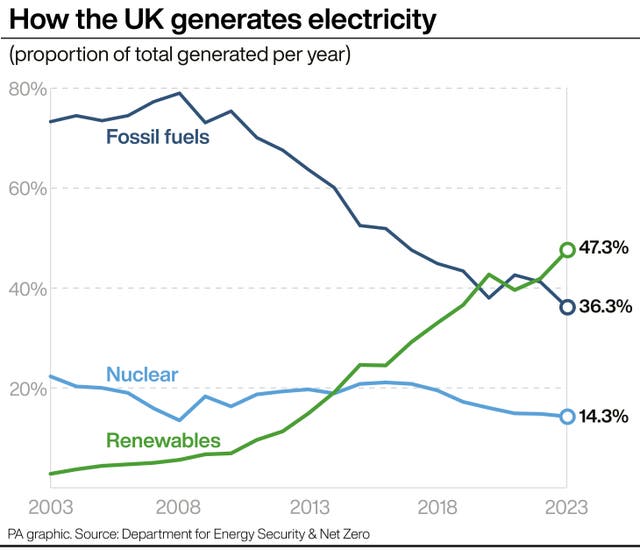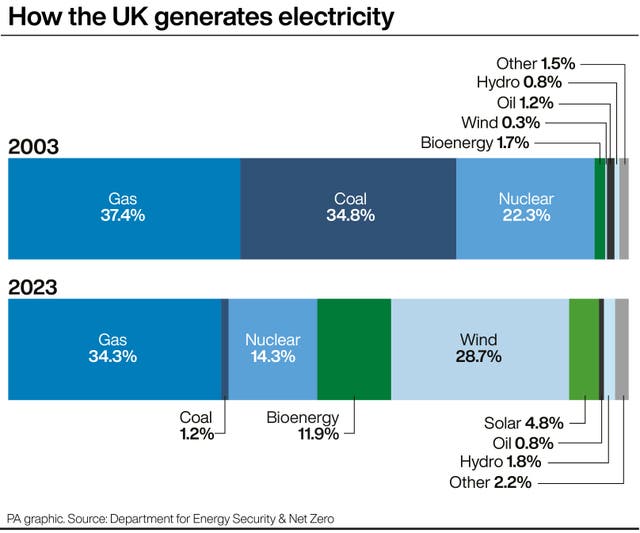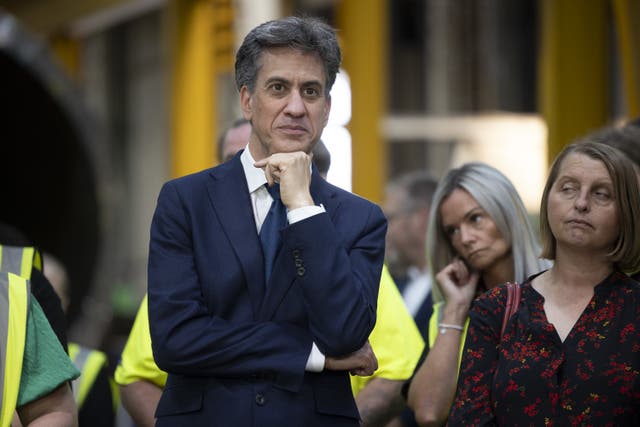PM: Reaping benefits of clean power will ‘take time’ but bills will fall by £300
Prime Minister Sir Keir Starmer said ‘problems that have been left to fester for years’ by the previous government cannot be fixed ‘overnight’.

Sir Keir Starmer has warned it will “take time” to reap the benefits of clean power initiatives but stood by a claim that Labour’s plans will eventually drive down household bills by £300 a year amid confusion over the commitment.
The Prime Minister insisted the Government is “moving at pace” with the development of the publicly-owned GB Energy company but said “problems that have been left to fester for years” cannot be fixed “overnight”.
Hitting out at the Conservative record, he said chances to boost energy security had been missed by the previous government, leaving a “rot of short-sightedness and self-service” for Labour to clear up.
In a speech in Runcorn, Cheshire, Sir Keir said “every day” his administration is finding “more mess” that the Tories left behind.
“The hard graft of rebuilding this country has well and truly started, and it is vital that we begin immediately because the last government dropped the ball,” he said.
“They left us the worst inheritance since the Second World War, and every day – every day – we’re finding more mess that they’ve left for us to clear up, the rot of short-sightedness and self-service that has weakened the foundations of our country.”
Sir Keir’s speech was aimed at setting out new plans to team up with the Crown Estate, which owns the vast majority of Britain’s seabed, to boost the building of offshore wind farms.

It comes as the Tories and SNP cast doubt on a previous Labour pledge to help cut household bills by £300 a year, in part through GB Energy, its flagship green initiative.
The figure was missing from the official announcement of the new plans, and Downing Street repeatedly declined to use it when asked by journalists on Thursday morning whether it is committed to the number.
However, asked later during a question-and-answer session whether he stands by the pledge, the Prime Minister said: “Yes, I do – I stand by everything in my manifesto, and one of the things I made clear in the election campaign is because I wouldn’t make a single promise or commitment that I didn’t think we could deliver in government and that’s why we carefully costed and funded everything in our manifesto.
“That does depend on early firm decisions being made, which is why we’ve set up GB Energy, why we’ve announced the partnership today with the Crown Estate, and why the Energy Secretary has already taken action in week one in relation to onshore wind, in relation to solar energy and also pushing on with nuclear. So I stand by that commitment.
“What this brings us is lower bills, energy security, the next generation of jobs, and of course an important contribution to our obligations in relation to the planet.”

He added: “It will take time for this to develop, it will take time before we’re able to get the benefits of clean power, but that’s why we’re moving at pace.”
Former Siemens UK boss Juergen Maier has been appointed chairman of GB Energy, Sir Keir confirmed.
The Crown Estate has a £16 billion portfolio of land and seabed, and returns its profits to the Government, a small portion of which goes to the monarchy.
Much of its £1.1 billion profit last year came from offshore wind projects, and it is already engaged in a significant push to find and develop new plots of the seabed for companies to build wind turbines on.
In a separate Bill, the Crown Estate is set to be given new borrowing powers, confirmed in last week’s King’s Speech, which are designed to help it invest more in preparing its seabeds for offshore wind and other projects.
Under current rules, the Crown Estate cannot use its cash reserves to invest because it must hold them against the prospect of future financial losses.
It comes after the Government scrapped a de facto ban on onshore wind farms earlier this month, reversing planning measures brought in for England by the Conservatives in 2015 under David Cameron.

Speaking to broadcasters earlier on Thursday morning, Energy Secretary Ed Miliband said GB Energy will start generating returns “within the lifetime of this Parliament” but would not set a date for when people can expect bills to fall.
“Within a couple of years, as we build new onshore wind, new solar, we’ll start to see the effect on bills, but there are lots of things going on here. So our exposure to gas prices, which are set internationally, is something I don’t control… I can’t promise you what’s going to happen to gas prices.
“But I can say that, if we drive to clean, homegrown British energy, we will have much more control over what happens to bills,” he told BBC Breakfast.
Shadow energy secretary Claire Coutinho said the public have been “sold a lie” by Labour that their energy bills will drop by £300.
She claimed GB Energy will involve “funnelling taxpayers’ money into reducing risk for multimillion-pound energy companies” while the 2030 decarbonisation target “will hike bills and ramp up our dependence on batteries and cables from China”.
“Now they’re saying bills may go up… but the truth is even worse. Labour’s plans for energy are going to mean huge costs for British families.”
SNP net-zero spokesman Dave Doogan MP said: “The fact there has been such chaos and confusion in the Labour Government over this issue is a worrying sign that there is no clear plan to lower household bills – and the pledge Labour made at the election is in danger of being broken.
“People in Scotland were promised change at Westminster – and they now expect the Labour government to get on and deliver it. Keir Starmer must set out exactly how much families can expect to see their bills lowered this year – and over the next four years.”





